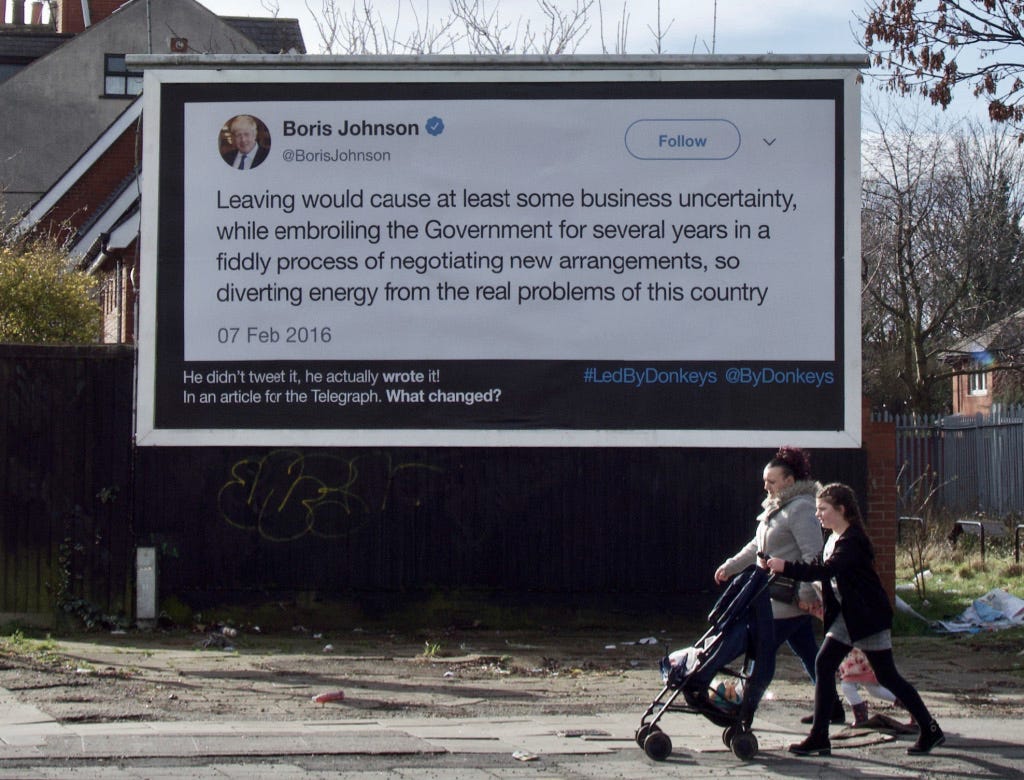Has Labour learned anything from Remain?
The government actually has to make a case for the things it believes — or risk proving the populists right
If I close my eyes, I can almost reach out and touch it. The words adorning a fridge magnet in my Grandma’s kitchen on Long Island, New York. You might know it as the Serenity Prayer:
“God, grant me the serenity to accept the things I cannot change,
the courage to change the things I can,
and the wisdom to know the difference.”
It hangs in my memory like a pendant of endless summer: driving to the farm for corn still cocooned in its pale green husk; the tears spilled over splinters acquired from the creaking outdoor deck; the awe of American TV, with its infinite channels and absolutely nothing to watch.
Take me back.
Squeaky bum time
This may surprise you, but I’m fairly relaxed when it comes to the things I cannot change. I sometimes even have the courage to change the things I can. But that third part? The wisdom to know the difference thing? Oy vey. If you want to send my nervous system into a rapid unscheduled disassembly, just tell it I have a tiny bit of agency and just enough time to do something about it.
There is, of course, an electoral angle. In an uncompetitive election, small things don’t really matter. A gaffe, a weak ground game, leaving an event to honour the 80th anniversary of the Normandy landings early for no apparent reason. But in a tight race, every decision matters. And the EU referendum, won 52-48 by Leave, was one such example.
Had Boris Johnson backed Remain, it is entirely plausible that the UK would still be a member of the European Union. As of June 2016, the then-Mayor of London was still that proverbial Heineken politician, trusted (or at least liked) by otherwise disparate voter groups and capable of commanding vast media attention. There is a reason David Cameron tried so hard to bring him onside.
But the fact that Johnson — a man who made both a journalistic and political career out of making things up about the apparent excesses of EU bureaucracy — would have been Remain’s greatest asset, speaks to the bind the UK’s pro-European movement had found itself in by 2016 (and long before that).
Look, you don’t need me to tell you that Remain ran a bad referendum campaign. Not least because I did so as recently as a couple of weeks ago.
The great and the good, from David Cameron and George Osborne to Sir Stuart Rose and June Sarpong, adopted a largely technocratic tone, warning that leaving the EU would damage the UK’s economy, security and global influence. Leave, meanwhile, tapped into something far more visceral, arguing that the UK should ‘Take Back Control’ of its sovereignty, laws and borders, as well as spend the £350m we definitely paid the EU every week on the NHS.
I don’t necessarily diverge from this telling. But it also misses the point. As Arsène Wenger once noted, contrary to popular belief, Newcastle United did not lose the 1995-96 Premier League title because Kevin Keegan got angry at Sir Alex Ferguson live on Sky TV. They lost it because they had no defence1. Similarly, Remain did not lose the referendum because of a poor 10-week campaign. It was getting its butt absolutely handed to it for much of the previous 40 years.
The blame game
Let’s play the blame game. Partly because, as I get older, it’s one of the few I can enjoy that won’t result in days of limping, but also because there is so much to go around. As of June 2016, a remarkable number of politicians who had spent years — in some cases decades — going on about how dreadful, inefficient, bloated, even corrupt the EU was, were suddenly warning the British people that leaving would be a decision of apocalyptic proportions.
Remember that David Cameron secured the 2005 Conservative leadership in part by pledging to withdraw from the European People’s Party, the main centre-right grouping in the European Parliament, as a sop to the Tory eurosceptics. And Labour politicians were frequently just as guilty. This psychology even permeated the machinery of government.
All governments relied upon — if not revelled in — claiming they couldn’t do things because of the EU, whether that be state aid restrictions or free movement of people. For example, every time a failing sector appealed to ministers for a bailout, the Treasury would always reply with words to the effect of: “We’d absolutely love to help. We’d like nothing more than to pour billions of pounds of taxpayer money into this bottomless pit. But EU state aid rules prevent us from doing so. Such a shame though!”
Where on Earth did voters get the idea that EU membership was more trouble than it was worth? Why did governments never bother explaining the reason for state aid regulations, and the fact that Britain was so often the one pushing for them in Brussels (answer: to stop those sneaky French and Germans from unfairly supporting their own national champions). In other words, over multiple political generations, we got used to simply abandoning the principle of advocating for things on their own merits.
This is not a purely British disease, mind you. Friend of the newsletter and Director of UK in a Changing Europe Anand Menon, recalled a conversation with a European Commission official, who told him of a visit from a French minister begging them to block more state aid to Air France, before adding: “Obviously, we’ll criticise you if you do it.”
Back to reality
Of course, this is 2025, not 2016. There is no EU referendum, and no prospect of one. But there will be a general election in a few years’ time, which may not look so different to the battle between Leave and Remain. As I wrote last week, British politics is splitting into two broad camps: the Left and the Right. As of now, Labour leads the former, Reform the latter.
The similarities between Reform and Leave are striking. Not just because Nigel Farage is a main character again, but because a vote for Reform will, like Brexit, be a vote for change. A vote for Labour will, like Remain, be a vote for the status quo. The mistake would not be for Labour to run a bad election campaign, but to think that it is winnable at all if they wait until then to fight it.
Instead, Labour needs to be making the case now. If Reform and the Conservatives want Britain to leave the European Convention on Human Rights, Labour cannot simply retort: “We can’t. It’s against international law!” Or “We can’t. Because Northern Ireland!” These may be true, but they’re not arguments. They’re the rhetorical equivalent of a declaration of unilateral powerlessness. And it risks simply proving the populists’ point.
The same can be said for immigration — do people move to Britain because we have open borders, or because we need immigrants for our public services to function, our economy to grow and because diversity can be a strength? Or the fiscal rules — are they a necessary evil because the UK is on its fiscal knees, or because they give investors the confidence to place their money in Britain, providing jobs, lower interest rates and other nice things?
I’m not arguing for a permanent campaign. The government badly needs to actually govern well. But it also needs to be making a case every single day about why the things it does are good, and why those it does not do are for a bloody good reason. In other words, not because there is no alternative, or foreign courts are bossing us around, but because we choose to abide by them and accrue the benefits of that decision.
If Labour waits until spring 2029 to make this case, it will achieve the same result Remain did in June 2016. It needs the courage to argue for what it believes — and the wisdom to start now.
Actually, Wenger is slightly off here. Newcastle only conceded 37 goals that season. Ironically, the problem for ‘The Entertainers’ was a lack of firepower up front. But the broader point remains.





I do hope Starmer reads your Lines…
Let me propose a thought that Cameron is and was a coward in 2013 in promising a referendum on the EU in the middle of austerity and the probability that he would lose the 2015 elections. In 2016 when a referendum was inevitable there was no concern about the consequences of a Leave vote. No requirement for a 67% majority to Leave. No votes for the British people living in the EU, who could vote in our general elections. No votes for 16-18 years old despite Article 50 requirement of two years negotiations. Jacob Rees-Mogg and the ERG had Cameron in a head lock.i agree that BoJo would have swung it if he was not totally concerned with becoming PM. No one ever underestimated Boris in pursuit of his own interests. Then they found Dominick Cummings, who capacity to win by cheating, telling untruths and whatever skulduggery he could muster left nothing to be desired. You may remember how little Farage and Aaron Hunt played in the press but somehow £7 million was spent on advertising, and £450,000 was forwarded to the DUP in Northern Ireland to pay for advertising in England. To this day no one knows where that money came from. The people of NI knew that the EU was an essential part of their economy and voted Remain. If only the numbskulls in England had the same political nous we would still be in the EU.